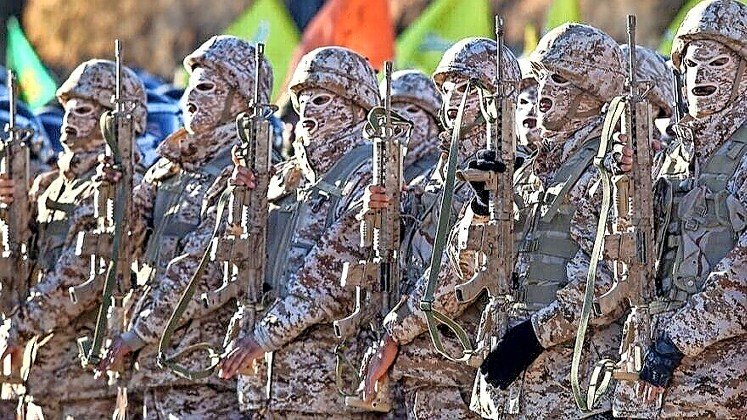Israel’s long-term strategy pushes Iran strikes
Recent days have seen rapid-fire reports of dramatic military operations throughout the Middle East. All the reports have two things in common: The targets are Iranian, and they are attributed to Israel.
According to US officials quoted in the Wall Street Journal and New York Times, Israel was behind a drone strike on a military facility in the Iranian city of Isfahan. Various reports suggested that a site producing ballistic missiles and UAVs was targeted.
A day later, reports came in of seven people being killed and six trucks destroyed in an Israeli airstrike on a convoy of trucks moving from Iraq into Syria. The strike occurred near the city of Al-Bukamal, according to Al Arabiya, with the Saudi outlet quoting the London-based Syrian Observatory for Human Rights (SOHR) war monitor as stating that the convoy was transporting Iranian weapons. According to SOHR, none of the casualties were Syrian nationals.
All of this occurred just ahead of US Secretary of State Antony Blinken touching down in Israel on Monday for discussions on Iran, as well as the Israeli-Palestinian conflict, with Israeli Prime Minister Benjamin Netanyahu.
Iran has been attempting to smuggle weapons and the materials needed to construct them into Iraq, Syria and Lebanon for years. The goal of these efforts has been to arm its Lebanese proxy, Hezbollah, as well as to create a Syrian Hezbollah.
A decade ago, Israel initiated a shadow war against Iran’s entrenchment efforts in Syria, launching airstrikes when Iranian smuggling attempts were detected. The campaign, dubbed “the campaign between wars” by Israeli defense officials, has since evolved into one of the pillars of the country’s security doctrine, and has ramped up significantly over time.
When the campaign began in 2013, it reportedly comprised some three operations a year. These days, according to a speech made by former Israel Defense Forces Chief of Staff Lt. Gen. Aviv Kochavi in December, “We are launching every kind of operation, on average, every week.”
The logic behind the campaign is simple, though its implementation is complex. The goal is to disrupt the military build-up of Iran and its axis, via low-profile military actions, throughout the Middle East, while avoiding a full-scale war.
The campaign is enabled by Israel’s intelligence and air power superiority, but it is not without its risks. Despite these risks, however, we could now be witnessing a significant expansion. In recent years, the IDF has come to take a holistic view of Iran, viewing the threat it poses as being much broader than just that emanating from its nuclear program — which is developing in a disturbing manner.
The nuclear program remains the most serious threat; If Iran acquires nuclear weapons, the world’s approach to dealing with it will shift dramatically. At the same time, Iran’s terror-army network, in the Middle East and elsewhere, is a constantly evolving threat, to which Iranian entrenchment in the region, and weapons proliferation, particularly in Syria and Lebanon, are closely linked.
In May 2022, Maj. Gen. (res.) Eyal Zamir, the freshly appointed director-general of Israel’s Defense Ministry, produced an important study that provides a glimpse into a new doctrine that is gradually impacting Israel’s defense establishment.
In the paper, published by the Washington Institute for Near East Policy, Zamir, also a former deputy IDF chief of staff, laid out a concept known as Long-Term Competition (LTC). According to Zamir, Iran’s long-term goal is to eliminate Israel and become the regional hegemonic force. It intends to accomplish this by arming proxies and partners, encircling Israel with rings of rocket and missile bases, and draping a nuclear umbrella over the tightening noose.
In response, Zamir wrote, Israel must develop a new theory of victory, based on the concept of long-term competition with this bitter regional foe.
Essential aspects of the long-term competition are the ability to leverage asymmetric advantages, embrace ideological competition, compete fully and holistically, operate with allies, and play the long game, while thwarting the enemy’s plans and staying several steps ahead.
Zamir called for the Iranian Islamic Revolutionary Guards Corps to be made the prime target of this campaign, since it is Iran’s true center of gravity, and weakening it means eroding Tehran’s regional power.
Constantly hitting targets related to Iran’s proxies, applying direct pressure on the Iranian regime as a result of its terrorist acts, and expanding Israel’s covert operations to include the entire Iranian regime, the IRGC and regional Iranian assets are all among the objectives outlined.
Zamir urged Israel to first target Iran’s offensive capabilities, denying it the capacity to destabilize the region with its military and resources, and limiting its growth to surrounding states, before forcing it to retreat.
Whether or not such a plan is being implemented now is an open question, but what is beyond doubt is that the tempo and scope of operations against Iranian targets went into higher gear in recent days.

 48.0°,
Light Rain
48.0°,
Light Rain 




